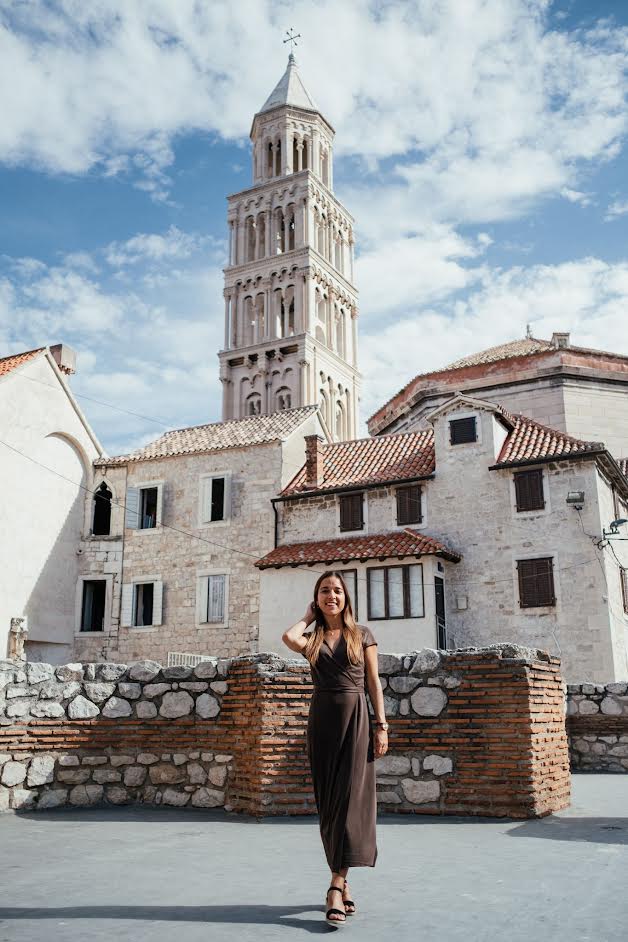Croatian Medico Hospital Develops Innovative Spine Treatment Method
July the 29th, 2021 - The Croatian Medico Hospital, which is a special hospital, is the first in the entire world to develop an innovative and quite remarkable method for the treatment of the spine.
As Poslovni Dnevnik/Marija Crnjak writes, the Croatian Medico Hospital is starting a project to invest in the application of an intervertebral disc patch (IVD patch), a new personalised method of treating damaged spinal discs, as well as the introduction of a software solution for the early detection of lumbar spine damage.
This scientific research project was positively evaluated and funded within the IRI project from European Union (EU) funds, and the obtained funds will be invested in further research and development of this minimally invasive method of treating lower back pain, the hospital reports.
The total value of the project carried out by the Croatian Medico Hospital amounts to a massive 14 million kuna, of which more than half is paid for by grants.
The special hospital's collaborating institutions are the Department of Biotechnology, the University of Rijeka, the ''Martin Horvat'' Special Hospital for Orthopedics and Rehabilitation from Rovinj and their project partner, Penta d.o.o. from Pula. The project is being implemented within the Competitiveness and Cohesion Operational Programme, within the program for research, development and innovation (IRI).
As one of the leaders in the introduction and application of new, modern technologies in diagnostics and treatment, the Croatian Medico Hospital noted the need for the profession to step forward in the treatment of lower back pain, which is frighteningly common, it also noted a lack of available solutions in treatment and diagnosis of spinal disc damage.
Although research/scientific projects are a specific feature of university hospitals, the Croatian Medico Hospital, as a private health institution, is one of the few that has received European Union funds for its scientific research to invest in the further development of its innovative method.
In addition to the research process focused on the IVD patch - an innovative combination of stem cell injections, the uniqueness of this project is reflected in the development of a software solution (AI) - a form of artificial intelligence that will improve the standardisation of radiological results/findings. The functioning of the software in practice has been conceived on the principle of the early recognition of degenerative changes.
The basic expected role of the software will be to alert radiologists and neurosurgeons so that they can observed damage to the intervertebral discs between the five existing lumbar vertebrae and to provide an optimal assessment of whether a patient is a candidate for a minimally invasive intradiscal method of treatment to regenerate the disc.
"We're extremely proud of the project and the recent start of this innovative method, which aims to improve the overall treatment of patients with damaged cartilage of the spinal discs, but also shorten their rehabilitation period,'' said the project leader and neurosurgeon Zlatko Kolic, the director of this special hospital.
In the preparation and implementation of clinical research and application of autologous IVD patches, as well as clinical and neuroradiological monitoring, the Croatian Medico Hospital will work closely with Antonija Jurak Begonja from the Department of Biotechnology, University of Rijeka, and Marinko Rade, the director of the "Martin Horvat" facility.
"I see the opportunity to work with experts at Medico Special Hospital on the application of IVD patches as progress in researching non-invasive methods for the treatment of the spine and I'm proud that here in Croatia, we have the opportunity to develop this innovative and complex project that I believe will benefit patients and doctors who deal primarily with spinal injuries in their work,'' said Marinko Rade.
The regenerative method and the outcomes of its application in treatment will be monitored through an eighteen-month-long clinical study and will be compared with the treatment outcomes of other, previously known, intradiscal methods.
For more, follow Made in Croatia.
7.5 Billion Kuna Paid Out to Micro and Small Croatian Enterprises
July the 29th, 2021 - The government introduced job preservation measures in an attempt to tackle the devastating effects of the coronavirus pandemic and all of the related lockdowns throughout 2020. When it comes to micro and small Croatian enterprises, the amounts paid out to keep their heads above water are generous indeed.
As Jadranka Dozan/Poslovni Dnevnik writes, according to the daily "barometer" of the Croatian Employment Service (CES), there are currently 126,175 unemployed persons officially registered as such across Croatia, which is slightly less than were officially registered back at the beginning of the month.
The latest available data from the Central Bureau of Statistics (CBS) and the Croatian Pension Insurance Institute for the month of June this year confirmed this positive continuation of employment growth.
According to the CBS, there were a total of 1.56 million employees across Croatia in the middle of the year, and the number of insured persons reached 1.6 million, recording the fourth month of consecutive growth when compared to last year.
In addition to domestic economic recovery, these developments are also influenced by the aforementioned measures to preserve jobs (ORM) introduced shortly after the outbreak of the coronavirus pandemic. From last March to the end of May this year, 11.05 billion kuna in aid for was paid out to companies.
Of that amount - and in addition to co-financing the payment of salaries, the measure of compensation of fixed costs introduced at the end of last year has also been included - standing at 8.24 billion kuna which was paid last year, and 2.81 billion kuna which was paid out during the first five months of this year. Most of the money from these measures in the past 15 months, about 5.3 billion kuna of it, was directed to micro Croatian enterprises (with up to 10 employees), and a further 20 percent ended up going to small Croatian enteprises (which have between 11 and 50 employees).
As opposed to small Croatian enterprises, for the purpose of preserving jobs, less than 1.8 billion kuna was diverted to medium and large enterprises. Both the amount and the number of workers covered by these measures are now gradually decreasing.
For more, make sure to follow our dedicated business section.
Zagreb Dominos Pizza Among World's Top 5 in Terms of Delivery Speed
July the 29th, 2021 - The Zagreb Dominos Pizza restaurant, located close to the Sheraton Hotel in the heart of the city, has been ranked among the world's top five Dominos Pizza restaurants in terms of delivery speeds.
As Poslovni Dnevnik/Marta Duic writes, Dominos Pizza, a world-famous American pizza company, will soon open the doors of yet another location here in Croatia, in Zagreb's Tresnjevka, more precisely in Trakoscanska Street (Ulica).
All about pizza is responsible for the arrival of the huge company which is very well known as the global leader in terms of pizza delivery with more than 18,000 locations. The expansion of business operations in our country coincides with the celebration of the company's first anniversary of operations here in Croatia.
"The Tresnjevka location was planned as our second location right from the very beginning. A lot of our customers come to our first location near the Sheraton Hotel from that part of the city, however, due to the limited delivery zone we weren't able to deliver to their home addresses.
We're planning the opening up in August, the space will be the same design in which we'll follow the combinations of black walls, brick and wood. The kitchen is always in the same design, lined with tiles that are white-black combinations, and the oven that is the heart of Dominos Pizza will remain red. It's going to be a smaller space, but that's why we'll have a terrace with a dozen seats,'' revealed Mihael Sviben, the directo of All about pizza when discussing the next Zagreb Dominos Pizza location.
They currently have five employees, and according to Sviben, they're store managers, operations managers, dough making operations managers and the so-called junior manager, and the rest of the team consists of about forty students, which is excellent for the job market.
“Opening a global franchise during a time dominated by an unprecedented crisis was a challenge. In following the situation with the coronavirus pandemic, we invested effort and will and worked every day to improve our services, whether that meant operations within the company itself, the organisation of suppliers, product improvement, to negotiations with suppliers in order to get our hands on the highest quality ingredients.
With this effort, we managed to climb the ladder and be ranked among the top five branches in the world in terms of our delivery speed, and back in January we were third in the world in terms of the number of pizzas sold. Our average delivery time on a weekly basis is just nineteen minutes, and the sales of our products didn't stop even during the most difficult epidemiological conditions, they even increased later on,'' explained Sviben, adding that he is especially pleased with the fact that most of the foods placed on Zagreb Dominos Pizza's food are originally from Croatia, which is what they've been aiming for from the very beginning.
Although the first plan is to expand across the country, Sviben isn't ruling out expanding to the rest of Croatia's immediate region.
"We plan to further develop the franchise in all parts of the City of Zagreb and in other Croatian cities as well, such as Rijeka, Osijek, Zadar, Split, Pula," concluded Mihael Sviben.
For more, follow our business section.
Pelješac Bridge Finally Completed!
July 28, 2021 - What always seemed to be an unattainable dream (even in recent years) is now a reality: the Pelješac bridge has been completed tonight and Croatia is one again.
The impossible is no longer so, and as of tonight, the Croatian territory reconnects with Dubrovnik via the Pelješac bridge, and the Neum corridor will no longer be the way to the Pearl of the Adriatic and back. Tonight at 11 pm, the last segment of the steel span structure of the Pelješac Bridge will be installed, which will connect the mainland from Komarna with Brijesta on the Pelješac peninsula. Although the vehicles will not cross the new bridge until June next year, tonight's connection of its construction will be one of the most important dates in the calendar of this, as the Minister of the Sea, Transport and Infrastructure Oleg Butković called it: ''the project of all projects''.
Prime Minister Andrej Plenković and several of his ministers, present at a celebratory event. (Video: Index.hr)
The project started on several occasions, but for various reasons, it stalled until a contract worth half a billion euros was signed in April 2018, of which the European Union gave as much as 85 percent. The contract entrusts the construction to the Chinese consortium China Road and Bridge Corporation (CRBC), one of the globally largest and most experienced in such works. It was also the first such project of a Chinese company in the European Union.
Dubrovnik Mayor Mato Frankovic shared an emotional post on his Facebook account, reflecting on the importance of the project for the Pearl of the Adriatic, and the story behind it. ''After 303 years, the extreme south of Croatia will be connected to the mother country, and we, the inhabitants of this part of Croatia, will cease to be second-class citizens waiting in a column at the border crossing for transit from one part to another. In recent days, many have been trying to direct the historical chronology of the Pelješac Bridge towards one, two, or some third option'', he wrote in his Facebook post. Franković also thanked PM Andrej Plenković, and he ended his post by saying that ''to the questions of what the bridge should be called, the answer is actually simple: the Pelješac Bridge and let it be guarded by St. Blaise and St. Rocco.
Likewise, the publication was accompanied by a video in which the progress of the bridge can be seen until a few days ago. You can see it below:
When talking about the impossible, it is precisely difficult not to go back thirty or twenty years, and remember the times when the project was groped around but without any concrete plan. Even since the project began three years ago, there have been many, many occasions where political tensions and doubts arose not only about its completion but about its development itself.
Now, the Peljesac bridge is a reality after the tireless and titanic efforts made in these three years and not only because of the demand for a bridge of these dimensions but also because of the area and the climatic conditions in which it was built. It is worth mentioning that the completion of the project has occurred in a very early period, and for this it would be necessary to work even at night and at dawn, taking into account the strong winds and storms that hit the area.
For more news about Croatia, click here.
Mandy Fransz of Make the Leap Digital on the Digital Nomad Opportunity
July 28, 2021 - One of the star speakers of last month's Zagreb Digital Nomad Week was Mandy Fransz from the Netherlands. She caught up with TCN after a little relaxation on the Croatian coast.
It is a few weeks now since the conclusion of Zagreb Digital Nomad Week 2021, the first conference of its kind in the Croatian capital. There was plenty of positive energy throughout the week, despite the heat, including several inspirational speakers. Among them was Mandy Fransz from the Netherlands, who flew in for the event, before continuing her Croatian nomad journey to the Adriatic, where she worked remotely for a couple of weeks after the conference. TCN caught up with Mandy to get her perspective on the future of remote work, and the opportunity for both Zagreb and Croatia.

1. Your company Make the Leap Digital sounds like an exciting journey. How did it come to be?
I quit my corporate 9-to-5 office job at LinkedIn's European headquarters in early 2018 without a solid plan. The only thing I knew was that I wanted to explore the opportunities to work and travel. I booked a ticket to Bali, Indonesia as I knew it was known as one of the most popular destinations for remote workers and digital nomads. I joined a co-working space as I believe in the power of networking with like-minded people such as remote workers and digital nomads and attended organized events, workshops, meet-ups etc. This is how I met my first freelance client, without having a website or even a registered business. Upon return, I decided to cancel my lease and moved all of my belongings to the Netherlands (I was living in Dublin, Ireland at the time) and registered my business Make the Leap Digital to help entrepreneurs and businesses to unlock the power of LinkedIn.

2. I love this line on your website - What if I could teach others how to digitally transform the way they work — perhaps traveling the world while I’m at it?
Tell us firstly how much different your working day and approach is these days? Back in corporate, I was working a traditional 9-to-5 office job and at some point I was even expected to come into the office at 8AM. Since I quit my job, I work whenever and wherever I feel the happiest or most productive. I've been a digital nomad for 1,5 years and I've worked, lived, and traveled in beautiful destinations such as Bali, Portugal, California, and Colombia. I'm now based in Rotterdam, the Netherlands and mainly work from home but when travel restrictions allow I love to go on a regular "workation" to beautiful places like Croatia for a change of scenery. This really helps to spark inspiration and creativity while having the freedom to travel and explore the country and culture during weekends. I now work with clients around the world from the comfort of my laptop either from home, a co-working space, or a nice cafe. But, most importantly -- I am grateful to help my clients to unlock the power of LinkedIn and remote work so they can digitally transform the way they work and they, too, can enjoy the freedom and flexibility to work from wherever they feel the happiest and most productive.
3. And now what about the challenges and obstacles to encouraging people to make that leap. How do people leave their comfort zone and take that leap?
When I quit my job to explore the world of remote work, I had no idea how I was going to make this happen. The only thing I had was a big dream and the courage to take a leap of faith. Based on my experience, I'd say, think about what it is that you'd like to achieve within the next 5 - 10 years, and take small steps towards that big dream or ambitious goal. The best things happen outside of your comfort zone, and sometimes you need to take a leap of faith. Learn to embrace uncertainty and view failures as opportunities for growth. Believe me, the remote work opportunities are endless, especially now the pandemic has accellerated the adoption of remote work by at least 10 years.
4. In Croatia, we are just becoming aware of the remote work opportunity and how it could shift things significantly. Paint us a picture. How do you see the workplace in 5 years?
I believe that the traditional 9-to-5 office job will become obesolete and companies will need to adapt remote work to meet the changing demands of the global workforce. Different studies show that remote work not only increases productivity, but it also provides some key benefits such as lower real estate costs and attracting and retaining top talent worldwide. The traditional workplace will most likely transform into a central hub focused on in-person collaboration, creativity, and community, with an increasing number of co-working spaces. Additionally, companies will need to adopt sustainable remote work policies to digitally transform their workforce from culture, communication, and collaboration in order to thrive in a fully remote or hybrid environment. We've just gone through the world's largest remote work experiment, now it's time to take those learnings and embrace the potential of remote work in the long term.

5. How does a city such as Zagreb prepare to meet this changing demand?
I think Zagreb has done a phenomonal job by organizing and hosting the Zagreb Digital Nomad Week recently. At this stage, it is all about connecting different stakeholders from co-working spaces, tourism, hospitaliy, digital nomads and remote work advocates to learn from each other and to make sure everyone is on the same page. Now, the next step is to take small incremental steps towards your common goal to transform Croatia into one of the world's top destinations. Remember, remote work is a marathon, not a sprint.

6. There is a lot of buzz about Croatia as the next digital nomad destination, especially with the new permit. How does Croatia rate on the scene in your opinion, and can you give us 3 quick wins to improve things considerably.
Having experienced digital nomad life in Croatia for a few weeks now, I can definitely say that Croatia has all the key ingredients to become one of the world's top destinations for digital nomads and remote workers. You have it all: the culture, warm weather, great food, central location, fast Wi-Fi, and beautiful nature with a combination of mountains, natural parks, and islands with crystal clear water. If there's anything that Croatia can improve, I'd say focus on providing the best digital nomad experience by 1) investing in inspirational co-working spaces, 2) collaborating with different stakeholders to provide a great infrastructure from flexible gym memberships, mobile phone contracts, co-living arrangements and 3) building a community of like-minded people by organizing local events and meet-ups such as an interactive workshop, networking session, lunch & learn etc.

7. Tell us about your role in ZDNW, and why did you decide to come?
I'm grateful for having been invited as one of the keynote speakers at the Zagreb Digital Nomad Week to host a session about LinkedIn - Online Presence and a keynote on The Rise of Remote Work. I've been in Croatia briefly in the past, and I always wanted to come back to explore the country and digital nomad scene. It was the perfect opportunity to learn about the culture, food, and digital nomad life while meeting an amazing group of like-minded people. After spending a week in Zagreb, I decided to extend my stay with a "workation" on the coast and visited Split, Hvar, and Brac. The whole experience far exceeded my expectations and I will definitely be back very soon!
You can follow Mandy Fransz via LinkedIn.
For more news and features about digital nomads in Croatia, follow the dedicated TCN section.
Zagreb Stock Exchange Indices Go in Opposite Directions
ZAGREB, 28 July, 2021 - The Zagreb Stock Exchange (ZSE) indices on Wednesday changed slightly, going in opposite directions, while regular turnover was modest, however, overall liquidity was increased by the block trading in HT telecommunication company's shares, amounting to HRK 2.66 million.
The Crobex rose by 0.15% to close at 1,934.02 points while the Crobex10 dropped by 0.11% to 1,192.41 points.
Regular trading amounted to HRK 4.4 million, almost three million less than on Tuesday.
The total liquidity was increased by the block trading in HT shares in the amount of HRK 2.66 million, at a price of HRK 190 per share.
HT shares also generated a turnover of some HRK 203,000 in regular trading, closing at HRK 190.50 per share.
In regular trading, none of the stocks crossed the million kuna mark, the closest to it being Ericsson Nikola Tesla with a turnover of HRK 916,800. Its price rose by 0.30% to HRK 1,660.
Thirty-four stocks traded today, with 19 of them registering price increases, 9 recording price decreases and 6 remaining stable in price.
(€1 = HRK 7.523)
For more about business in Croatia, follow TCN's dedicated page.
Homeland Movement Accepts Miroslav Škoro's Resignation
ZAGREB, 28 July, 2021 - The presidency of the Homeland Movement (DP) party on Wednesday unanimously accepted party leader Miroslav Škoro's irrevocable resignation as well as the resignation of secretary-general Dario Žepina, launching disciplinary proceedings against DP MP Vesna Vučemilović, who is Škoro's sister.
DP vice-president Mario Radić said that the party leadership concluded that preserving DP's stability was of the utmost importance at present and that "the party's unity was not in question at any moment, despite media reports to the contrary."
He added that disciplinary proceedings were launched against DP member and MP Vesna Vučemilović because she had abused her position in the party and caused harm to the party's reputation.
The disciplinary proceedings should be completed in 90 days and until then, Vučemilović's status and rights are suspended, it was said.
DP MP Stephen Nikola Bartulica said that he was sorry Vučemilović had walked out of today's party meeting, dismissing her claim, posted on her Facebook wall, that there had been attempts to silence and intimidate her.
DP Presidency member Igor Peternel expressed confidence that the party's future was not in question.
The DP will decide about its new leader in the autumn.
Radić reiterated that he would not run for DP president and that he was also not considering reactivating his term as a member of parliament.
DP officials said they did not expect their party group in the parliament to fall apart.
For more about politics in Croatia, follow TCN's dedicated page.
Confectioner Kraš Reports 64% Increase in H1 Profit
ZAGREB, 28 July, 2021 - The Kraš confectionery group generated a net profit of HRK 21.9 million in the first half of 2021, an increase of HRK 8.6 million or 64.2% over the same period in 2020, according to its financial statement released on Wednesday.
Consolidated revenue reached HRK 488.2 million, up by HRK 30.4 million or 6.6%, with sales revenue totalling HRK 481.4 million. Sales revenue increased by 15.8% to HRK 257.7 million on the domestic market and by 9.1% to HRK 220 million on the foreign markets.
Expenditure increased by 4.2% to HRK 461.1 million.
(€1 = HRK 7.523368)
For more about business in Croatia, follow TCN's dedicated page.
Croatia Logs 198 New Coronavirus Cases, 2 Fatalities
ZAGREB, 28 July, 2021 - In the past 24 hours Croatia has registered 198 new cases of coronavirus and two people have died as a consequence amid 1,042 active cases, the national COVID response team reported on Wednesday.
There are currently 143 hospitalised patients and 11 of them are on ventilators.
A total of 146 people have recovered over the past 24 hours and 3,267 people are currently self-isolating.
Since 25 February 2020, when the first case of the contagion was identified in Croatia, there have been a total of 363,039 people infected with the novel coronavirus, of whom 8,249 people have died and 353,748 have recovered, 125 of them in the past 24 hours.
To date, a total of 2,281,574 tests have been conducted, including 6,141 taken in the past 24 hours.
By 27 July, a total of 3,031,563 doses of vaccines had been administered, with 40.1% of the total population or 48.2% of the adult population having been inoculated.
Altogether, 1,628,084 people have received at least one vaccine dose, of whom 1,450,537 have been fully inoculated (1,403,476 persons have received two doses and 47,058 have received the single-dose Jannsen vaccine), which makes up 43.05% of the adult population.
For more about COVID-19 in Croatia, follow TCN's dedicated page.
SDP Expels Six Prominent Members
ZAGREB, 28 July, 2021 - Six prominent members of the opposition Social Democratic Party (SDP) have not had their membership renewed following membership reviews in the party's Zagreb and Slavonski Brod branches, Hina learned unofficially.
The members in question are: MP and former cabinet minister Ranko Ostojić, MPs and former secretaries-general Zvane Brumnić and Nikša Vukas, MP Marina Opačak Bilić from Slavonski Brod, who was involved in a financial scandal, former head of the Zagreb branch Gordan Maras, and Tihomir Barišić, best man to former party leader Davor Bernardić.
The reasons for their expulsion are of a political nature. They were told that people who did damage to the party or refused to take an active part in recent local elections could not keep their membership cards.
With these decisions, the SDP has been left without four MPs and now holds 28 seats in the 151-seat parliament. The question is whether there will be more expulsions and how Bernardić will react, given that these are mainly his associates.
According to unofficial sources, the six expelled members were called by SDP leader Peđa Grbin to tell them that their membership would not be renewed.
After the membership review in Zagreb, it is estimated that of the previous 4,000 members about 1,700 are left now, as members who could not be contacted or have not paid their membership fees for more than a year have also been expelled.
Writing in a Facebook post, Maras said that he would never sell his views to win anyone's favours. "What matters the most to me is you who support me without any interest and just because you know that i am OK. There are stages in life and nothing happens without a reason. I believe i didn't let you down," Maras said in a message to his followers.
For more about politics in Croatia, follow TCN's dedicated page.


